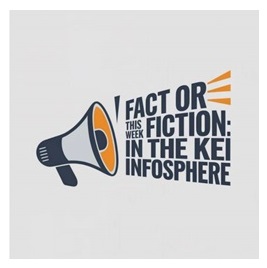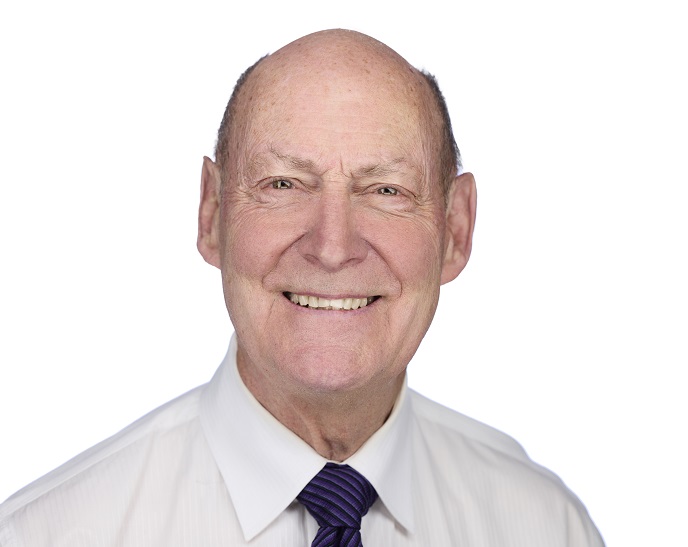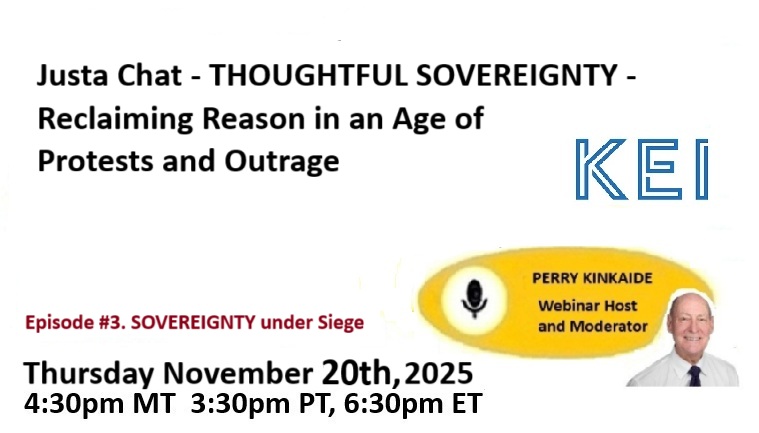|
THOUGHTFUL SOVEREIGNTY - Reclaiming Reason in an Age of Protests and Outrage |
DIRECTORY | ||
|
CONTRIBUTIONS: Powering Intelligence in An Integrated World HERE |
ACTION: Help sustain KEI's contributions |
Fact or Fiction?
The Classroom - A Failing Experiment HERE |
|
|
Editor - Perry Kinkaide |
In an age where every opinion is a declaration, the quiet act of thinking has become radical. Policy has yielded to performance, and free speech has morphed into protests, posturing, and free outrage. We react faster than we reflect, and democracies everywhere are straining under the rise of populism and the weight of instantaneous emotion. Artificial intelligence now amplifies both the problem and the possibility: it can accelerate outrage with algorithmic precision, yet it can also serve as a dispassionate counterweight — a tool for reflection, analysis, and the restoration of calm inquiry. |
||
|
This article argues that true sovereignty — personal and political — begins with the sovereignty of thought. It calls for leadership grounded not in spectacle but in deliberation, and for citizens willing to pause before posting and think before reacting. Our democratic task is not merely to protect free speech but to rediscover how to think freely. In that spirit, we offer this edition as an invitation to reclaim reason in a noisy age. — Editor |
|||
|
THOUGHTFUL SOVEREIGNTY - Reclaiming Reason in an Age of Protests and Outrage Once upon a time — not so long ago — policy was something made, not performed. Margaret Thatcher in Britain, Ronald Reagan in the United States, and here in Alberta, Ralph Klein, all decided that the best advice was no advice at all. Civil servants were deemed “expensive,” “biased,” and worst of all — “thoughtful.” Steve West swung the axe in Alberta, and popularity soared. It was the dawn of a new kind of politics — one that equated governance with messaging. The seasoned public servants who once offered foresight and balance were replaced by pollsters fluent in optics. Policy-making gave way to campaigning. Thinking became secondary to trending. The Politics of Everything. Half a century later, the consequences are everywhere. From climate change to classroom bookshelves, from gender pronouns to gas stoves — everything has become political. Thinking is optional; reacting is mandatory. The ideal of free speech — once the cornerstone of democratic debate — has mutated into free outrage. And the numbers bear it out:
Nothing today is merely information. Everything is stimulus. As one observer quipped, “Everyone’s shouting into the void — and the void is applauding.” Barack Obama put it more sharply: “If everything is an outrage, then nothing is.” Democracy is becoming a place where everyone is speaking, and few are listening. Continued below
No need to register. Just Zoom in https://us02web.zoom.us/j/84258596166?pw.. Continued from above When Outrage Goes Uncontained. History teaches what happens when outrage is allowed to expand without structure or remedy.
More contemporary examples are easy to find:
Enough is Enough! Politics has become a theatre of contrarians, where opposing simply to be seen opposing is the sport of the day. Even the most loyal partisans are weary. The polls and populism, the twitching nerve endings of democracy, now steer governance day to day. Legislatures are sidelined. Statistics and soundbites dictate what passes for strategy. We are saturated with expression but starved for understanding. Orwell once wrote that “to see what is in front of one’s nose needs a constant struggle.” That struggle is lost in the noise. The right to speak freely has devolved into the right to rage endlessly. Our youth, as voiced through the KEI Network’s series Youth at the Crossroads, sense this futility. They long for authenticity, mentorship, and meaning — not noise, but purpose. They ask what their elders forgot to: what kind of future are we rehearsing when every voice must be the last word? How Outrage is Resolved. Across history, three channels repeatedly transform outrage into order:
The Return of Dispassion. In AI and Our Future, we explored whether artificial intelligence might rescue us from our own noise — dispassionate, informed, tireless, and free of political ambition. Could AI become the civil service we dismantled — a rational counterweight to emotion? Perhaps. Yet, as the Age of Creativity reminded us, the risk is real: in automating thought, we may only automate outrage. AI stands at the hinge of human behaviour — a tool able to ignite outrage or quell it.
This is the architecture of acceleration. Yet the very same technology can de-escalate:
AI is both the match and the water. Which role it plays will be sovereign choice — not technological destiny. The reform we need isn’t digital at all — it’s human. A return to measured conversation, to the courage to pause before posting and to think before reacting. Thinking matters; that is not to deny feeling. Be unafraid to innovate, to think outside the group. Following is hardly thoughtful. The next political, public, and classroom revolution could be called, simply, “Calm Down.” Imagine that — a movement to restore forethought, reflection, and the dispassionate art of thinking before speaking. Leadership not by algorithm or applause, but by awareness. Protesting vs. Innovating: Public Fury vs. Private Creativity. Outrage expresses itself in two fundamentally different ways:
Protests clear the ground; innovation builds the future. The tragedy today is that we teach young people to express before we teach them to reflect. Feeling precedes thinking, when it historically followed it. Sovereignty—whether national or personal—requires the opposite sequence. Where to Next? Across KEI’s 2025 journey — from Youth at the Crossroads to AI and OUR Future to The Age of Creativity — one insight stands out: the future belongs not to those who speak the loudest, but to those who think the deepest. Our challenge now is to reclaim that depth — to turn free speech back into meaningful dialogue, and outrage into understanding. Because the most revolutionary act in an age of noise may be, once again, to think — calmly, creatively, and with conscience.
How Canada can convert the 51st state threat into a sovereignty saving, economic opportunity? What does Canada need to do first and why? Join us in Victoria as we continue the dialogue. Seating is limited to 40 Max. BUT you are invited. Perry Kinkaide, editor and producer for the KEI Network, will be serving as moderator in the interview and public discussion. FOR MORE and/or for adding your group to the schedule of future dinners please contact Admin@KEInetwork.net
William Jones - is a veteran entrepreneur with 40+ years in international business. advising governments, legal and financial institutions, airlines, real estate developers, and energy companies across Canada, the United States, and the Caribbean. A recognized change agent subject-matter expert for three decades, Bill has helped organizations navigate infrastructure, data, and communications at scale. He is currently developing the Alberta Economic Embassy (AEE), a next-generation data centre and innovation campus in Edmonton designed to anchor sovereign compute and industrial growth in Western Canada. Bill was recently invited by the KEI Network to speak and discuss sovereignty and Canada’s geopolitical positioning—especially Canada-U.S. relations. |
||||||






